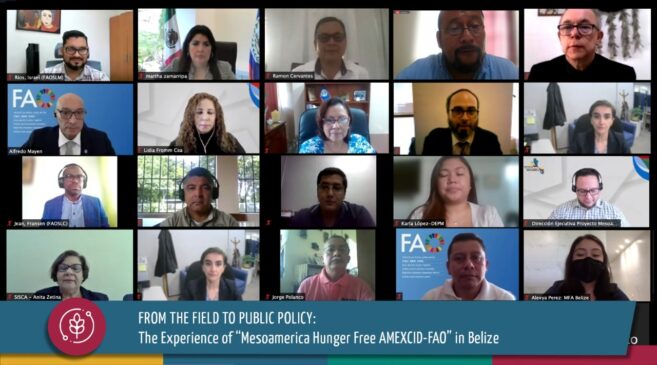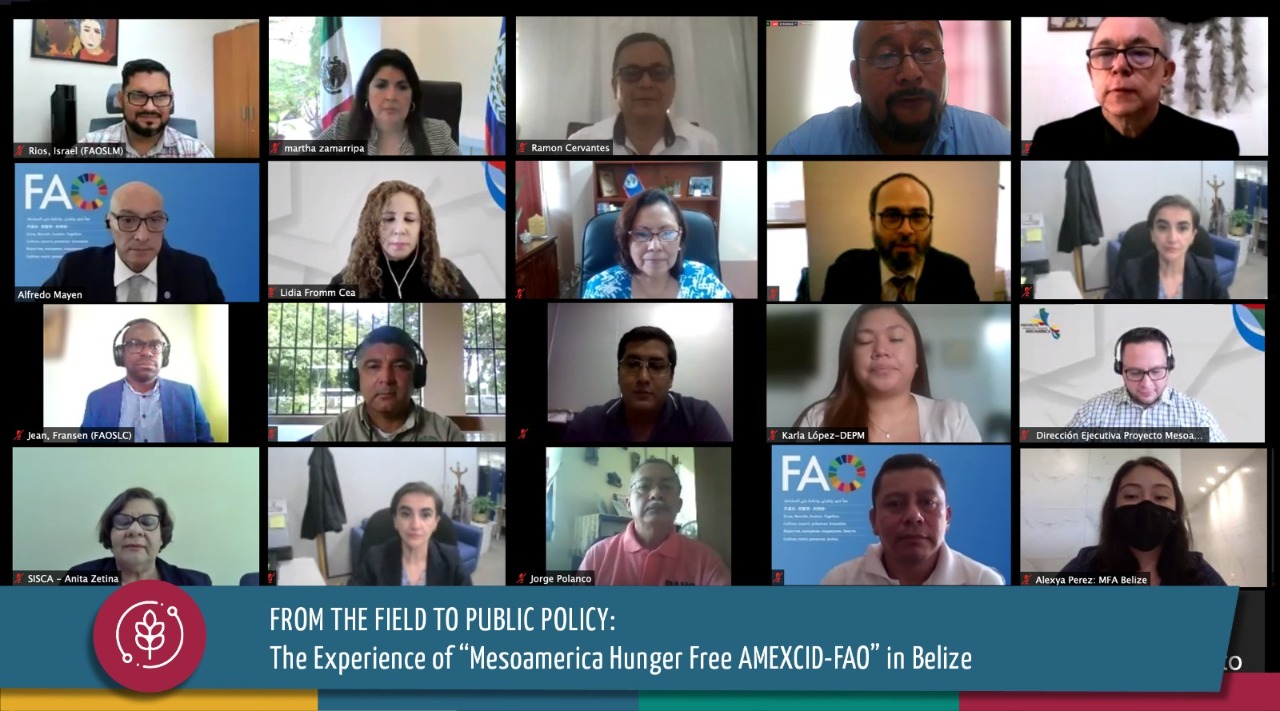Schools are a favorable environment to promote, from childhood, healthy dietary habits for life, while opening the door to viable market options for local family farming, thus contributing to improve national production and consumption of local food.
As part of the high-level policy dialogue promoted by the “Mesoamerica Hunger Free AMEXCID-FAO” program, a virtual meeting was held jointly with the Executive Directorate of the Mesoamerican Integration and Development Project (MP), as a follow-up to the work plan for the second half of 2021 of the Joint Presidency of the MP, held by Mexico and Honduras. The purpose of the meeting was to share the experiences and results achieved within the framework of “Mesoamerica Hunger Free AMEXCID-FAO” in Belize.
In Belize, the work of “Mesoamerica Hunger Free AMEXCID-FAO” focuses on the implementation of a school feeding program following the “Sustainable Schools” model; it has contributed to the implementation of a pilot experience for the validation of the Model in four primary schools in the communities of Pueblo Viejo, Santa Elena, Santa Cruz and San Antonio, in the Toledo district.
The implementation of the Model goes beyond providing healthy and nutritious meals to children living in vulnerable and poor conditions, as it places special emphasis on the analysis of the nutritional study of the students, the participation of the educational community, the implementation of pedagogical school gardens, and the direct purchase of products from family farming. It also includes the adequacy of infrastructure for the reception, storage, preparation and consumption of food.
With the title “From the field to public policy: The experience of the “Mesoamerica Hunger Free AMEXCID-FAO”, the main results, progress, and achievements of the Program in the country were discussed, among them:
- Preparation of a nutritional plan based on the analysis of the nutritional situation of schoolchildren and the mapping of the supply of local production
- Training for teachers, students, and their families in the preparation and consumption of healthy food, and in the establishment of school gardens
- Design and validation of a mechanism for the procurement of products from local family farming
- Strengthening of the productive capacities of family farmers in terms of quality, quantity, and safety of foodstuffs
- Formation of a National Technical Committee on Sustainable School Feeding with a vision of institutionalizing the “Sustainable Schools” model for school feeding
- Development of a national menu for the School Feeding Program
- Systematization of the pilot implementation of the “Sustainable Schools” model to expand it to other areas of the country (delivered to the Government of Belize in June of this year)
- Establishment of the Parliamentary Alliance against Hunger and Malnutrition in Belize
Pilot actions in the field result in validated tools, which are systematized and, in turn, result in methodologies that facilitate the development of more effective and sustainable policies and instruments at the local, national and regional levels.
During the session, special guests, such as the Ambassador of Mexico in Belize, H.E. Martha Zamarripa; Belizean Ministers Jose Abelardo Mai, Ministry of Agriculture, Food Security, and Enterprise; and Ramon Cervantes, Ministry of Foreign Affairs, Foreign Trade, and Immigration; and Yolanda Góngora, Director of Education of the Ministry of Education, Culture, Science, and Technology of Belize, shared their experiences from different fields, covering topics such as family farming, healthy eating habits, pedagogical gardens, and infrastructure, among others. They also thanked FAO and the Government of Mexico for their support to the country.
The “Mesoamerica Hunger Free AMEXCID-FAO” program
“Mesoamerica Hunger Free AMEXCID-FAO” is a joint initiative of the Government of Mexico, through the Mexican Agency for International Development Cooperation (AMEXCID), and the Food and Agriculture Organization of the United Nations (FAO), which works in coordination with institutions in Belize, Colombia, Costa Rica, El Salvador, Guatemala, Honduras, Nicaragua, Panama, and the Dominican Republic, to provide them with innovative development solutions.
The Program supports national efforts for the design, validation, and support of public policy instruments and regulatory frameworks that contribute to achieving food and nutritional security and rural development in these nine countries, with emphasis on the most vulnerable territories. It also stimulates collaboration, articulation and generation of synergies between institutions and local, national, and regional entities, promoting their linkage to rural and indigenous communities, civil society, and international organizations, which results in a solid institutional framework and strong ownership by its actors and participants.
Twitter thread with interventions from participants:
https://twitter.com/FAOCaribbean/status/1469030979872428035?s=20


